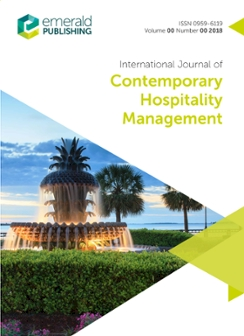Linking employees’ challenge-hindrance appraisals toward AI to service performance: the influences of job crafting, job insecurity and AI knowledge
IF 9
1区 管理学
Q1 HOSPITALITY, LEISURE, SPORT & TOURISM
International Journal of Contemporary Hospitality Management
Pub Date : 2023-05-26
DOI:10.1108/ijchm-07-2022-0848
引用次数: 2
Abstract
Purpose This study aims to explore the associations linking employees’ challenge-hindrance appraisals toward artificial intelligence (AI) to service performance while considering the dual mediating roles of job crafting and job insecurity, as well as the moderating role of AI knowledge. Design/methodology/approach A survey was administered to a sample of 297 service industry employees. This study examined all the hypotheses with Mplus 8.0. Findings This study confirms that challenge appraisal toward AI has an indirect positive influence on service performance via job crafting (motivation process), whereas hindrance appraisal toward AI has an indirect negative influence on service performance via job insecurity (strain process). Meanwhile, AI knowledge, serving as a key personal resource, could strengthen the positive impacts of challenge appraisal toward AI on job crafting and of hindrance appraisal toward AI on job insecurity. Practical implications Organizational decision-makers should first survey employees’ appraisals toward AI and then adopt targeted managerial strategies. From the perspective of service industry employees, employees should adopt proactive coping strategies and enrich their knowledge of AI to meet the challenges brought by this technology. Originality/value The primary contribution of this study is that we enrich the literature on AI by exploring the dual mediators (i.e. job crafting and job insecurity) through which AI awareness affects service performance. Moreover, this study advances our understanding of when appraisals toward AI influence job outcomes by identifying the moderating role of AI knowledge.将员工对人工智能的挑战阻碍评估与服务绩效联系起来:工作塑造、工作不安全感和人工智能知识的影响
目的本研究旨在探讨员工对人工智能的挑战障碍评估与服务绩效之间的联系,同时考虑工作塑造和工作不安全的双重中介作用,以及人工智能知识的调节作用。设计/方法/方法对297名服务业员工进行了抽样调查。本研究用Mplus 8.0检验了所有假设。本研究证实,对人工智能的挑战评估通过工作塑造(动机过程)对服务绩效有间接的正向影响,而对人工智能障碍评估通过工作不安全(压力过程)对服务绩效有间接负面影响。同时,人工智能知识作为一种关键的个人资源,可以加强对人工智能的挑战评估对工作制定的积极影响,以及对人工智能障碍评估对工作不安全的积极影响。实际含义组织决策者应该首先调查员工对人工智能的评价,然后采取有针对性的管理策略。从服务业员工的角度来看,员工应该采取积极主动的应对策略,丰富他们对人工智能的知识,以应对这项技术带来的挑战。原创性/价值本研究的主要贡献是,我们通过探索人工智能意识影响服务绩效的双重中介(即工作塑造和工作不安全),丰富了人工智能文献。此外,这项研究通过确定人工智能知识的调节作用,加深了我们对人工智能评估何时影响工作结果的理解。
本文章由计算机程序翻译,如有差异,请以英文原文为准。
求助全文
约1分钟内获得全文
求助全文
来源期刊
CiteScore
16.90
自引率
31.50%
发文量
239
期刊介绍:
The International Journal of Contemporary Hospitality Management serves as a conduit for disseminating the latest developments and innovative insights into the management of hospitality and tourism businesses globally. The journal publishes peer-reviewed papers that comprehensively address issues pertinent to strategic management, operations, marketing, finance, and HR management in the field of hospitality and tourism.

 求助内容:
求助内容: 应助结果提醒方式:
应助结果提醒方式:


